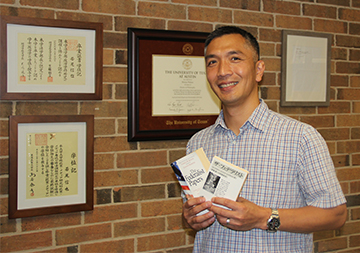In election year, COM professor researches voting trends

In Shinya Wakao’s office three official documents hang from his walls – one degree emblazoned with the University of Texas seal and two in Japanese script.
Wakao’s studies have led him backpacking across China, translating surveys in Tokyo, dissecting data at University of Texas and finally to College of the Mainland, where he teaches U.S. and Texas Government.
Exploring a tale of three governments, Wakao, of League City, will speak at College of the Mainland’s fourth annual symposium “Time and Place as Context” April 29 at noon on how location affects people, and therefore politics.
“Liberal people in Austin may be conservative if they move to New York City,” said Wakao. “All politics is local. If you want to be a politician from Texas you have to think about who they are, what they want and what they think. We need data to measure.”
With colleagues from the University of Texas, Wakao has done just that.
With professor Taofang Huang, he analyzed reams of data to explore trends on Asian-American voting patterns – or their lack.
“Normally highly educated, high-income people vote. Asians have much higher income and education levels than whites, but they don’t [vote]. Why?” asked Wakao.
His research suggests the answer may lie in parenting – many Asian parents emigrated from non-democratic countries, such as China and Vietnam, where their experience with democracy was merely theoretical.
“Often parents from democratic countries talk about politics. Maybe that’s why their kids vote,” said Wakao. “We found according to our data maybe that’s true. Those from democracies such as South Korea and Japan tend to vote more frequently.”
Now he and David L. Leal, a University of Texas professor, and Byung-Jae Lee, a professor at Yonsei University in Korea, are delving into the likelihood of Hispanics voting, analyzing census data, especially people’s self-claimed ethnicity and the ethnicity of their parents.
Those who identify themselves as white even if their parents are Hispanic are more likely to vote than those who identify as Hispanic, explained Wakao.
The desire for this collaboration with colleagues is what first led Wakao to the United States.
“I read this book “The Voice of the People: Public Opinion and Democracy” [by James S. Fishkin], and it talked about current problems of democracy. It talks mainly about U.S. but in Japan we have same problems,” said Wakao.
At the urging of his mentor, Wakao enrolled at the University of Texas at Austin. Wakao, who spoke Japanese and Chinese, admitted his first classes at the University of Texas were a challenge.
“I couldn’t speak English very well. I could read and write it,” said Wakao.
He began English as a second language classes at University of Texas at Austin, then enrolled in doctorate classes in political science.
Even before he graduated, he began teaching as an adjunct. He became a full-time COM professor teaching U.S. and Texas government in 2013.
“I believe everybody has to know about government,” said Wakao. “Politics affects everything – college costs, taxes and the economy. In class if students can see how it affects their lives, maybe it increases their motivation.”
A Japanese citizen, he offers his students a perhaps different reason among many to participate in elections.
“U.S. elections are very important not only to your country but other countries. It’s important to Japan’s economy and defense [since] Japan doesn’t have a military,” said Wakao.
A subscriber to news magazines since middle school, he works to instill that thirst for knowledge in his students.
“I use a lot of data, charts, graphs, articles and video. My role is to bring information and ask students to analyze,” said Wakao. “At the end of the day, students have to analyze for themselves.”
Meanwhile, his own studies continue as he looks for a better understanding of the volatile world of politics.
“I’m doing research,” he said. “I’m still learning.”
